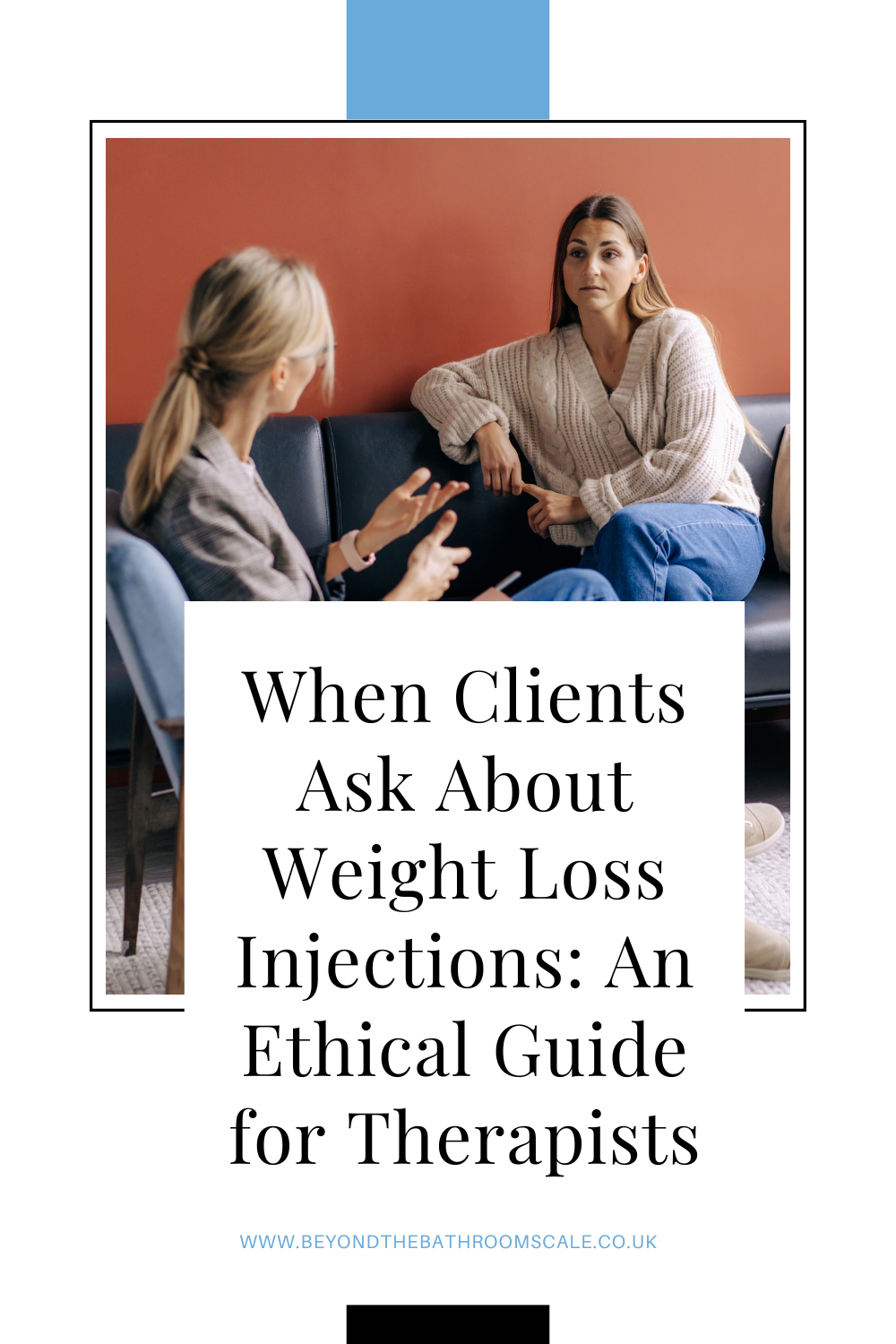When Clients Ask About Weight Loss Injections: An Ethical Guide for Therapists
As weight loss injections like Ozempic and Wegovy become more widely used and discussed in the media, many therapists are beginning to hear the same question from clients:
“What do you think about me going on Ozempic?”
Whether it's brought up as a casual thought, a desperate hope, or a point of conflict, the topic can be deeply charged. It may sit at the intersection of physical health, emotional distress, weight stigma, body image, trauma, and personal identity.
As therapists (especially those who work from trauma-informed, body-inclusive or HAES-aligned perspectives), how do we respond to these conversations ethically and supportively, without reinforcing weight-centric narratives or pathologising clients’ bodies?
Here’s a guide to help you navigate these nuanced discussions with care.
1. Start With Curiosity, Not Correction
It can be tempting to leap into a strong stance, especially if you’re passionate about anti-diet work. But it’s important to pause and stay curious. Begin by asking open, non-leading questions to better understand your client’s inner world.
You might say:
“What’s making this feel like the right option for you?”
“What are you hoping will be different if you take it?”
“Have you been given much information about the medication?”
“How does your body feel to live in right now?”
This helps shift the conversation away from the medication itself and into the territory where therapy can truly help: exploring beliefs, fears, expectations, and self-worth.
2. Acknowledge the Realities of Living in a Weight-Stigmatising World
If a client expresses interest in Ozempic, it may reflect real, lived experiences of shame, exclusion, or poor medical care due to their body size. Denying that reality, or rushing to reframe it, can feel dismissive.
Instead, try naming the truth:
“It makes sense you’d want relief from that pain. You’ve had to navigate a lot in your body.”
Affirm that their desire for weight loss might come from a place of survival or longing for respect. The goal isn’t to shut down the desire, but to explore it with compassion and nuance.
3. Hold Space for Ambivalence and Mixed Feelings
Most clients don’t feel one thing about weight loss medications—they feel many things. Relief. Hope. Shame. Pressure. Doubt.
Your role is not to resolve this ambivalence, but to help them explore it safely. Clients may need space to say:
“I don’t know if I’m doing this for me or to please others.”
“I’m afraid of what will happen if I lose weight and still don’t feel better.”
“I want to want to love myself as I am… but I don’t.”
This is tender, vulnerable ground. Your clinical skill lies not in finding the “answer,” but in helping them hold complexity with gentleness.
4. Be Mindful of Your Own Biases and Countertransference
If you have strong feelings about GLP-1s, weight loss, or your own body image journey, it’s worth taking time to reflect.
Ask yourself:
Am I responding to the client or reacting to my own history?
Am I subtly communicating judgment—even if I don’t mean to?
Am I offering care that aligns with the client’s values or my own?
Supervision and peer support can be valuable tools here. We don’t need to be perfect—just aware and accountable.
5. Use Language That Centres Autonomy, Not Control
Even well-intentioned language can veer into moralising. Try to avoid framing the decision to take a GLP-1 as “right,” “wrong,” “healthy,” or “unhealthy.” Instead, invite clients to explore how the choice aligns with their broader needs and values.
You might ask:
“What would support look like for you if your body changed?”
“How do you want to feel in your body, regardless of its size?”
“What would trusting your body look like, with or without medication?”
This keeps the focus on the client’s relationship with themselves, not the medication.
6. Stay Within Scope—But Don’t Dodge the Deeper Work
Therapists are not prescribers, and we shouldn’t give medical advice. But we are equipped to support the emotional layers beneath the decision to pursue weight loss.
These might include:
Disordered eating or history of dieting trauma
Body image struggles and internalised weight stigma
The desire for control, safety, or validation
Fear of rejection or invisibility
You don’t need to comment on the medication itself to offer powerful, transformative support. Often, clients just want to be seen as a whole person, not reduced to a number on a scale.
7. Offer Resources That Support Body Trust and Mental Health
If your client chooses to begin or continue using a GLP-1, you can still offer resources that centre emotional wellbeing. This might include:
Body image journaling or reflection prompts
Psychoeducation on diet culture and weight stigma
Support groups or books from weight-inclusive practitioners
Mindful eating or intuitive eating adaptations for suppressed appetite
One such resource is my GLP-1 Coaching Workbook, designed specifically for people using GLP-1 medications who want to heal their relationship with food and body image.
It’s a non-judgmental space for clients to reflect on their values, fears, and needs, wherever they are in their journey.
Final Thoughts
When clients bring up Ozempic, they’re rarely just talking about medication. They’re talking about how they feel in their bodies, what it means to be visible or invisible, worthy or unworthy, seen or dismissed.
Our job isn’t to give an opinion—it’s to offer a container. One that’s steady, respectful, and rooted in the belief that every client deserves care that honours their complexity.
Let’s be the kind of therapists who hold space not just for decisions, but for the messy, human feelings that come with them.

